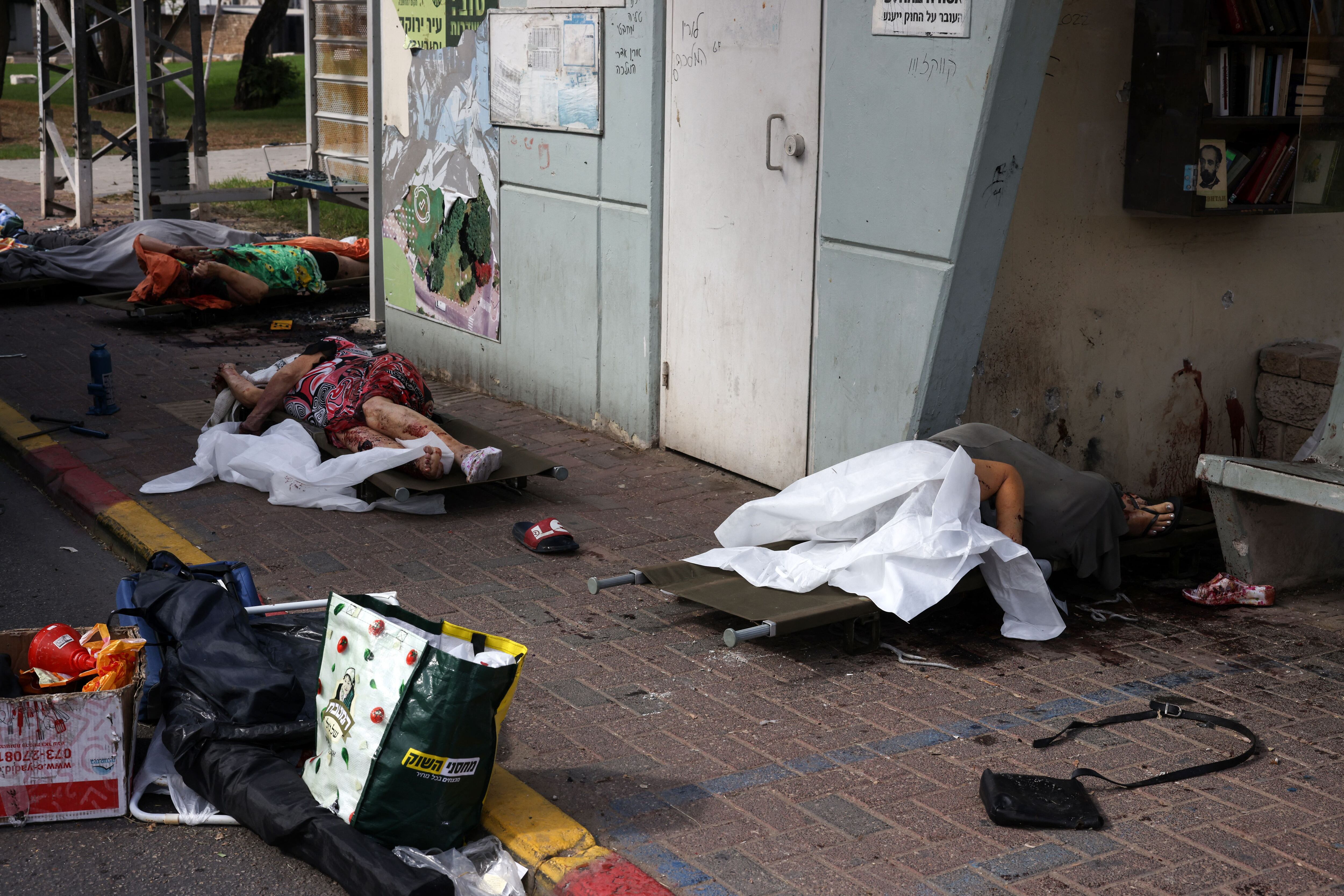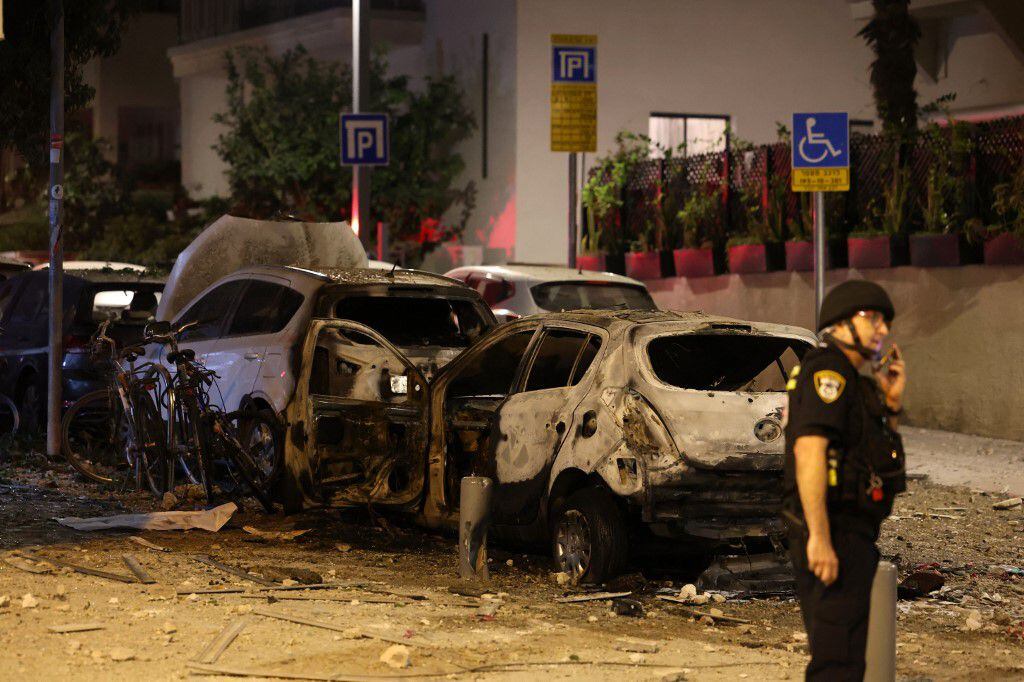In 1991, after the Persian Gulf War, in Israel The Civil Protection Law was issued, which establishes the obligation for all new constructions to include an armored security room or bunker in the face of the imminent danger of bombing the country.
TO LOOK: “Hell”: this is what an Israeli ground offensive would look like in Gaza, an overcrowded territory full of Hamas tunnels
One of the first indications they give to a foreigner visiting the Hebrew country is where the bunker is located in the house they rent, the institution they visit or the nearest one built on a public road.
These shelters are part of an entire culture of prevention that is regularly accompanied by training so that the population is always alert. Every Israeli knows how long they have to get to their shelter when the sirens start to sound in their area.
Therefore, when the alarms were triggered last Saturday morning, Peruvian Erika Miltier thought it was a new exercise. Without imagining that she was starting one of the worst tragedies suffered by the country at the hands of the Palestinian militia Hamas.
“I must warn you that the connection can be cut at any time, if the siren rings I must leave the phone and run to the shelter“, alerts Erika when starting the telephone conversation with The trade.
Born in Peru, mother of three and wife of an Israeli citizen, Erika and her family settled in Israel 12 years ago. They currently live in Kibbutz Gat, located in the south of the country and just 30 minutes from the border with the Gaza Strip, where the weekend attacks began.
“This is a horror film. One of those films that when you see it you think they are exaggerating. Nationality doesn’t matter here, anyone who lives in Israel is suffering from it. Whether you are in the south or the north, it affects everyone. We all have connections with a victim or with (the victim’s) mother, cousin or uncle. Plus soldiers are involved, it hits the whole country“, ensures.
-How did you experience the beginning of the attacks?
On Saturday, most people get up as lazily as possible because it is a day of rest. At 6:15 in the morning the sirens started to sound, as it was so early that I didn’t really understand what was happening, I imagined it was an exercise to be prepared for. I even hesitated to get up and hide in the bunker because there was no previous news or conflicts to report. We finally ran to the shelter with my husband, my children and even our dog. Shortly afterwards we understood that it was not an exercise. We started crying as one siren after another could be heard.
– Did they know what was happening outside at that time?
Between sirens and sirens we returned home to watch TV. And then the news started to arrive, the first was about the massacre that was happening at the psychedelic party. You couldn’t process anything, you didn’t have time to think. I even thought I was having a nightmare, that I hadn’t woken up yet. But it wasn’t like that. Through WhatsApp, my son’s friends started writing to him about what was happening at the party and he continued to inform me. Then more information started to arrive on TikTok, on WhatsApp, a lot of information arrived very quickly.

-How long did the chaos last that first day?
It still lasts. I don’t know how long it will take or when we will come out of this impact. All of us who live in Israel are devastated by what is happening. As a mother I am devastated, every hour a new report of victims comes out, a new death is reported that you thought would not be on the list. I have a 21-year-old son and he has already lost four friends, two were schoolmates who were at the party and two others were soldiers. He also has a group of friends on the front lines. My son has already completed his military service and is now preparing to study, but we will see (if he is called to the front) because it is not known in this situation. My husband is already there, working in the service. They’re all in the army now. We mothers try to console each other, we visit those who have suffered a loss. It’s a mourning for everyone, the atmosphere is sad. As strong and patriotic as Israelis are, the sadness this time is extensive.
– I understand that civil defense asked the population to provide shelters so that they could stay in them for up to 72 hours, did you receive this indication?
That’s right, that news came out at night and initially we were a little scared about it. They ordered us to supply ourselves because there is a possibility that there will be no electricity or water for 72 hours, and there are also instructions to keep us alert and indoors. But here people don’t panic, but organize themselves so that everyone can grab what belongs to them. In addition to volunteering, there are volunteers for everything from collecting clothes and supplies for soldiers to people offering to look after the pets of soldiers who must go to the front lines.
– What’s going on with work, how are you coping these days when you have to stay at home?
It all depends on your work. Mostly the State pays you for these days that you don’t work, but it depends on the company. In other cases, when the war ends, there is insurance that pays for the days – or part of them – that you cannot work.
– What went through your mind when the government announced that it was in a state of war?
Here, as you are the mother of a male child, you know that he will grow up and serve his country. No mother wants to send her son to the army, much less to war, but on the other hand, the Israeli people exist because of the soldiers who fight for their country. And the boys are prepared for this, they have incredible training. So, although it makes you sad, deep down you know that these are people prepared to do their jobs.
***
The tragedy, which has left at least 1,200 people dead so far, has caused consternation and despair among a large part of the population. This is the case of Urpi, a Peruvian who lives in the city of Rehovot, in the center of the country, a place that at first glance may seem far from the conflict zone, but here it is worth remembering that crossing the whole of Israel by car takes just three hours. .
Due to the emotional impact that the tragic events had on him, Urpi asked us to send his testimony by letter instead of offering an interview. Below is his letter:
***
Unlike the Gat kibbutz, in the Shokeda moshav, located 40 minutes further south, there was no time for the alarms to sound.
What woke up the population on Saturday morning were missile explosions, gunfire from helicopters and instructions from passing soldiers warning families to take shelter in their shelters. One of these families was that of Patricia Bensimon, a Peruvian who has lived in Israel since 1997 and in the aforementioned moshav since 2018.
“The siren didn’t go off, everything was a surprise. We woke up to a million missiles, helicopters, gunfire. We didn’t understand what was happening, we just ran to the bunker. They asked us to close the doors and windows. It was terrible. It’s very difficult to explain“, he counts The trade through a phone call.
– What happens next?
At that time we couldn’t go anywhere. neither from the bunker nor from the house. The terrorists entered a moshav next to ours, just two minutes away. We didn’t understand what was happening, but we spent four hours locked in the bunker. We heard sirens, followed by gunfire from helicopters.
-When did they manage to get out of there?
After four hours, my brother, who lives in the same moshav, told us to go to his house, that it was safe to move. So I asked my husband to go because his house is safer. We asked permission (from the soldiers) to leave one house to another, for everything we needed to ask permission because the alert was maximum. As soon as we left, the siren went off again and we only saw smoke around us. We arrived at my brother’s house and spent the day there.
– What happened on Sunday?
We woke up and there was no signal in the bunker, neither internet nor cell phones. We went out to the house to see what was happening and realized that we had to get out of there. My husband was drafted into the army and had to ride in our car. So I didn’t really know how to get out.
– How did they do it?
That same afternoon, my husband’s cousin called me to say he could pick me up and my children. At that time there were still terrorists around, but we asked permission from the soldiers guarding the perimeter and they managed to rescue us.
– How many kids do you have?
I have two small children.

– After they were evacuated, where were they taken?
My husband’s cousin took us to his house in Berseeba. On the way he asked him to speed up, not to stop at any time. I was shaking, but I couldn’t cry because I didn’t want my children to see me like that.
– Are you in a safe place now?
Yes, my father-in-law picked us up from Beersseeba and took us to another safe area. We couldn’t take anything out of the house, but thank God people were very supportive and gave the three of us clothes, as well as personal hygiene items.
-How is the situation in Shokeda?
On Monday more people left and very few remained, but there are still people there. Especially older adults.
– What future do you see after such an experience?
I hope everything that happens there changes. I have lived in that region for five years and every year there is war, but what we have now is abominable. How can we explain that they decapitate babies, that they take the elderly and children into animal cages? Those who do this have no soul.
Source: Elcomercio
I am Jack Morton and I work in 24 News Recorder. I mostly cover world news and I have also authored 24 news recorder. I find this work highly interesting and it allows me to keep up with current events happening around the world.

:quality(75)/cloudfront-us-east-1.images.arcpublishing.com/elcomercio/WQJTWJ76BZBZHDTSSJANFBNYKQ.jpg)





